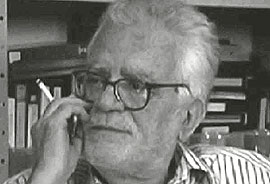BRAZILIAN RETROSPECTIVE – COUTINHO: THE PATH TO “CABRA”

The Path to "Cabra"
THE RENEWING IMPACT OF "Cabra Marcado para
Morrer" ("Twenty Years Later", 1984) by Eduardo
Coutinho on the Brazilian documentary, above all for
its reflexivity, seemed for at least a decade and a half
that it would stigmatize its director as one more filmmaker
remembered for one single great film. Coutinho's
self-reinvention through the end of "Santo Forte"
in 1999 with the consolidation of his "cinema of conversation"
device put any early evaluation aside. The
new direction in 2007 with "Jogo de Cena" altered the
game board once again, making any diagnosis about
the case of Coutinho in contemporary Brazilian cinema
even more complex.
After a long period out of circulation due to the
absence of copies in good condition, the digital
restoration of "Cabra" by Cinemateca Brasileira
returns the film to us with the same luxuriance of its
resounding premiere in Brazil in the wane of the military
dictatorship. There is no better opportunity to
reexamine the work itself and the process of forming
Coutinho, the documentary filmmaker, to the
crystallization of his first classic.
The special retrospective "The Path to "Cabra"", with
two debates and a series of screenings, has the privilege
of counting on Coutinho himself as virtual cocurator.
The two panels, one in São Paulo and the
other in Rio de Janeiro, gather the filmmaker's principal
partners in the resurrection of the "Cabra" project
three decades ago, which was originally fictional
and interrupted by the military government of 31
March of 1964, as well as those responsible for the
film's restoration.
Many times Coutinho has dated his conversion to
documentary cinema to his experience with the first
phase of Globo Repórter in the 1970s, marked at the
time by its partnership with independent production,
a pioneer in recuperating a special program organized
by It's All True in 2002 curated by Beth Formaginni. Of that production, he himself highlights four titles
selected for this cycle: "Six Days in Ouricuri" (1976),
"The Gunman of Serra Talhada" (1977), "Theodorico, The Emperor of Sertão" (1978) and "Exu, A Tragedy
in the Back Country" (1979). Included in this cycle,
the short "Coutinho Repórter" (2010) by Rená Tardin
presents a summary of this experience from testimony
by the filmmaker himself. "Cabra Marcado
para Morrer" was shot essentially between February
and March of 1981 with funding from Embrafilme
and production direction by Zelito Viana. A colleague
of Coutinho in his Cinema Novo beginnings, Eduardo
Escorel assumed the editing. As the film itself
explains, unlike the fictional "Cabra" of 1964 the new
version was done without a screenplay.
1962, João Pessoa, Paraíba. A film team from CPC of
UNE led by young Coutinho filmed a rally of protest
against the murder of rural leader João Pedro Teixeira.
The record intended to result in a fictional feature film
about the life of Teixeira, a project given up due to the
repressive wave of the new authoritarian regime.
1984, Rio de Janeiro. Eduardo Coutinho freed himself
from the ghost of a rough cut preserved for
twenty years in his house and the house of filmmaker
David Neves. Fiction became documentary
and the film about Teixeira transformed into a film
about the interrupted film about Teixeira, but also a film about the repressive and socially disintegrating
impact of the dictatorship, and still a film about
cinema as a preserver of memory – only three of its
levels of reading. Another landmark of the modern
documentary helps us contextualize the conception
of "Cabra" by Coutinho. He himself remembers the
impact of "Crônica de um Verão" (1961) by Edgar
Morin and Jean Rouch, the inaugural work of Cinema
Verdade that he watched at the heat of the time but discards as a direct reference during the preparation
of "Cabra". "Unconsciously, maybe," he recognizes, however, against the evident rhymes between the
two films, like the explanation of the filming process
as much as the relationship between filmmaker and
subjects. No surprise. "Cabra Marcado para Morrer"
is one of those rare works that synthesizes the history
of the genre that preceeded and anticipated the
history that would come – and will still come today.
Amir Labaki
Filmes da Mostra


|
Twenty Years After
EDUARDO COUTINHO (BRASIL / BRAZIL, 1984)
|


|
Chronicle of a Summer
JEAN ROUCH, EDGAR MORIN (FRANÇA/ FRANCE, 1959)
|


|
Coutinho Reporter
RENÁ TARDIN (BRASIL / BRAZIL, 2010)
|


|
Exu, A Tragedy in the Back Country
EDUARDO COUTINHO (BRASIL / BRAZIL, 1979)
|


|
The Gunman of Serra Talhada
EDUARDO COUTINHO (BRASIL/ BRAZIL, 1976)
|


|
Six Days in Ouricuri
EDUARDO COUTINHO (BRASIL / BRAZIL, 1976)
|


|
Theodorico, The Emperor of Sertão
EDUARDO COUTINHO (BRASIL / BRAZIL, 1978)
|
|





